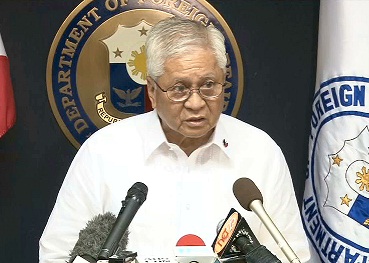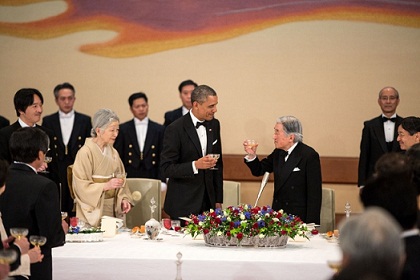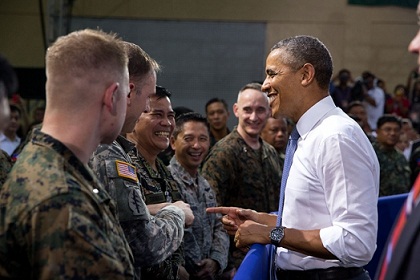
“Under the Mutual Defense Treaty, the United States will come to the assistance of the Philippines if our metropolitan territory is attacked or if our Armed Forces are attacked in the Pacific area.
“In 1999, in a diplomatic letter, the United States affirmed that the South China Sea is considered as part of the Pacific area.”
Del Rosario is pathetic. What is abhorrent about this is, he is resorting to disinformation. Either that or his geography is faulty: The Spratlys, the contested islands in the South China Sea, are not in the Pacific.
Lawyer Harry Roque said “Geography can’t be changed by Del Rosario. MDT says ‘Metropolitan territory’ and islands in the Pacific. Spratlys are not in the Pacific.”
Roque further said: “MDT mandates the United Sates to come to our assistance when our territory is attacked. But since the U.S. does not recognize our title over Spratlys, a Chinese attack there will not trigger application of MDT.”

In Japan, his first stop in the April 2014 Asia visit, Obama was very clear about the application of U.S. –Japan MDT in case of an armed conflict over Senkaku island, which the Chinese calls Diaoyu:“The policy of the United States is clear – the Senkaku islands are administered by Japan and therefore fall within the scope of … the U.S.-Japan Treaty of Mutual Cooperation and Security.”
Contrast that to what he said during the press conference in Malacanang last Monday: “Our goal is not to counter China; our goal is not to contain China. Our goal is to make sure that international rules and norms are respected, and that includes in the area of maritime disputes. We do not have claims in this area territorially. We are an Asia Pacific nation and our primary interest is the peaceful resolution of conflict, freedom of navigation that allows for continued progress and prosperity. And we don’t even take a specific position on the disputes between nations.”

” In other words, our commitment to defend the Philippines is ironclad and the United States will keep that commitment, because allies never stand alone,” Obama declared to a vigorous applause.
In his post-Obama visit statement, Del Rosario mentioned a 1999 diplomatic letter. He was referring to the letter of then U.S. Ambassador Thomas who said that “the South China Sea is part of the Pacific area.”
What Del Rosario didn’t say, and I’m presuming that he knows this as foreign secretary (otherwise it’s a tragedy) is that the phrase “Metropolitan Territory” excludes islands, rocks and reefs that are in dispute since these were not part of the Philippine territory that the U.S .administered when it granted independence to the Philippines on July 4, 1946.
An encounter between Philippine and Chinese forces in the Philippine-occupied Pagasa island will not make Obama order the soldiers stationed in U.S. facilities in Fort Magsaysay or in other military camps in the country under the newly-signed Enhanced Defense Cooperation Agreement to join the shooting war.
Now, what if “Armed Forces of the Philippines” in the Pacific Area are attacked?
An expert in the South China Sea, who asked not to be named, explained that “’Armed Forces of the Philippines’ that are outside the metropolitan territory refer to ‘public vessels or aircraft’ of the AFP. If China attacks BRP Alcaraz in the West Philippine Sea, then the US is bound by treaty to defend BRP Alcaraz, but not the Philippine soldiers stationed in Pagasa.”
Former Ambassador to the United Nations Lauro Baja, Jr. also noted that the U.S recognizes that the Senkaku islands have been under Japan’s administration while it always says that it takes no position in the conflicts in the South China Sea. “Hence the difference in language,” he said.
He advised Del Rosario to “ just accept the ironclad commitment by President Obama.”
EDCA, he said “ is at best an instrument of hope and I hope it sends the strategic message to China. “
Del Rosario should heed this advice from the veteran diplomat: “Let’s not dilute this expectation by unnecessary talks.”
Sec del Rosario is overly presumptuous. Mukha talaga siyang amboy na pulubi!
Last month, in April 2014, it was clear to me when our troops tried to resupply the marines stationed at the shoal, and they pushed through the chinese blockade, there was presence of US naval air plane in the sky above the shoal monitoring the incident. Hard to say whether the naval airplane was providing cover for our troops, but US is committed for sure.
I might be wrong but I never hear Del Rosario speaks Filipino.
Obama’s words
In Japan: “Our commitment to Japan is absolute…”
In the Philippines:: “Our commitment to the Philippines is ironclad…”
Does Harry Roque have a copy of the U.S.-Japan Treaty of Mutual Cooperation and Security? Maganda sana kung ma-compare natin ang language noong treaty na yun with our Mutual Defense Agreement. Baka magkaiba ang nilalaman ng dalawang treaty kaya iba din ang commitment ni Kano.
If BRP Alcaraz is in a disputed area and is attacked, the US will respond while a Filipino soldier in a disputed area will not trigger a reponse? Why is that? They are both in a disputed area.
How did Roque know for sure that that an attack on Pagasa will not trigger the MDT?
Is it BRP Alcaraz or BRP Sierra Madre or any Philippine government ship?
Jake,re #7. it’s not Harry Roque who said about BRP Alcaraz. He is a high government official, an expert in the South China Sea issue. For obvious reason (he holds an important position), he cannot be quoted but he helped me understand the issues.
From Cepheus Quinones:
You are getting murderous flak lately due to your critical analysis re EDCA/MDT. Be steadfast and resolute in exposing the truth for you are not alone; at least one appreciates your writing very much.
Ang mga Pilipino ay talagang hindi matuto sa karanasan at napakaikli ng memorya. Simple lang naman ang tanong ko: Bakit sa Japan, direkta ang salitang makikigera ang U.S. kapag kinanti ng Tsina ang Hapon at wala ng diplomatic ek ek pa, pero kapag sa Pilipinas, binabalutan ng mga katagang maraming kahulugan depende kung sino ang mag-i-interpreta? Ibig sabihin, nakikipaglaro lang ang U.S. sa atin at walang kaseguruhan kung tutulong nga sila kapag tayo’y inatake ng Tsina. Deja vu Ukraine. Nakakagigil ang mga kababayan nating nananaginip pa rin ng gising at nabubuhay na pala-asa. Nakaka-awa din naman kasi hindi sila nakawala sa gapos ng colonial mentality.
Is the West Philippine Sea the 200 mile EEZ? Since Pagasa is outside the 200 mile EEZ, the soldiers in Pagasa will not be saved? BRP Alcaraz cannot go to Pagasa without permission?
Palitan na ang gapos natin na Made in China. Ano ba naman na dagdagan pa ng isang gapos. Sanay na tayo doon;)
We should use EDCAs ambiguity to our advantage and negotiate with China. Respect our 200 mile EEZ, leave mischief reef. We might have to give up anything outside 200 miles. That way we can develop reed bank. Can you just imagine if we had five more malampayas?
ewan ko sa inyo. kaya ganyan ang statements ni Obama about Japan kasi nakalagay sa MDT nila na pati Japanese administered islands ay kasama sa dedepensahan. you’re comparing apples to oranges. ang Spratlys maraming claimants dyan di lang Pinas at Tsina di tulad sa Senkaku. tsaka di signatory ng UNCLOS ang US kaya di nila kinikilala ang claim ng sinumang bansa sa South China Sea.
jake naman, kaya nga pinupunterya ang Ayungin kasi ang Reed Bank ang totoong target nila dahil nandun ang oil at gas deposits. you should see the way they brainwash their citizens and encourage militias/fishermen to protect South China Sea from invaders. pag may nakitang Pinoy na mangingisda, report sila sa coast guard at navy nila.